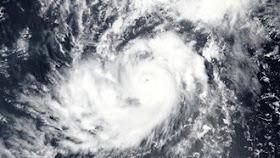 |
| Saturday, September 2, was a day of remembering. |
It was September 6, 1925, when my father, Ben Yoder, at 20 1/2, married his sweetheart, Mary Nisly, who had just turned 22 the week before.
Ninety-two years later, over 200 of their 606 descendants (1) gathered at the Bethel Mennonite Church activity center in Campbell County for two days of story telling and celebration. The four of us remaining siblings of Ben and Mary's nine offspring were all present, included my ailing 87-year-old brother
Sanford and his wife Martha from Costa Rica, along with scores of cousins, nieces, nephews and in-laws representing four generations.
They came from Costa Rica, Nicaragua, and Manitoba. They gathered from Montana, Kansas, Tennessee, Kentucky, Indiana, North Carolina, Pennsylvania and Ohio, as well as from at least five different counties in Virginia. Due to the significant number of people who had either lived or grew up in a Spanish speaking country, or who had served in a Latino culture, some of the singing we enjoyed was in Spanish as well as in English.
 |
| Some art and craft displays |
Displays of old letters, poems, articles and other artifacts of our family history were on tables around the meeting area, along with pencil and ink drawings (by sister Maggie), oil paintings (by sister-in-law Martha), and other art work, poetry and published writing by various family members.
For example, my 59-year-old nephew
Pablo from Nicaragua has had numerous books published that have sold by the thousands, including some narratives of his life story and that of his parents, Sanford and Martha, both before and after their move to Costa Rica a half century ago. He, along with his photographer son Jacinto, have also produced
two beautifully illustrated coffee table books on natural life in Central America.
Then there's my 58-year-old niece,
Judy Yoder, who has also written a series of widely sold books, most recently about her father Eli's life in rural Oklahoma and later in Kansas, and who is the author of a hard cover biography,
Vera's Journey, that has sold over 6000 copies, and is still available at Christian Light Publishing's book store in Harrisonburg (at a discount price, by the way). A resident of Floyd County, Judy was unable to attend the reunion due to a painful and debilitating back condition that has her doing most of her writing in a horizontal position. An amazing person.
Brother Sanford also continues to do some writing for one of the publications produced by
La Merced Publishing which he and some of his sons and a son-in-law founded in Costa Rica years ago. According to Mennonite historian John Roth, their Bible study and other material, including the bimonthly
La Entorche de la Verdad, with a vast readership all over Central and South America, is among the most widely circulated and read Anabaptist/Mennonite literature anywhere in the world. Sanford has also contributed numerous daily devotional readings to the bi-monthly publication
Beside the Still Waters, with a circulation of 280,000.
My parents would certainly not want any of us to elevate them or any members of their family, but I am grateful every day for my mom and dad, my siblings, and their many descendants who have used whatever gifts they had to serve God and others to the best of their ability. I think especially of
my sister who served as a nurse/midwife in Belize and in Paraguay for many years, the brother who has been a self supporting missionary in Costa Rica most of his adult life, and the scores of other family members who have done volunteer church-related work at home and abroad. One of my nephews could not be present because he was representing
Christian Aid Ministries assessment of rebuilding needs in Houston.
We are far from perfect. And lest you think we are only about dedication and hard work, I leave you with one of the humorous poems that my other ordained brother,
Eli, let me read during my last visit with him before he died of cancer in February. Eli, a great preacher and a fine furniture craftsman, was so modest I had never known he had even written any poetry. Many of his pieces are inspirational and serious, but one I read at the reunion, on a lighter note, he once wrote for his beloved Ruth:
If kissing could make money
It sure would suit me fine,
Because I'd just switch jobs
And ask for overtime!
Now that's some some truly good work even a Yoder can appreciate.
(1) The above number, 606 by my count, from the updated family directory done by niece Mary Sue Zehr, includes spouses, adopted children, step children and 26 deceased family members.















